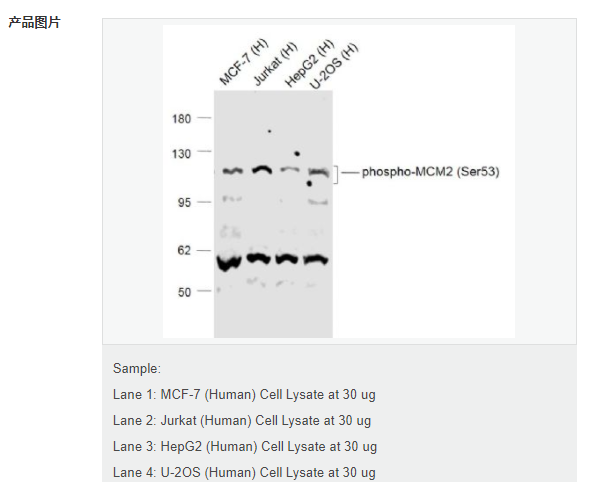

貨號(hào)
產(chǎn)品規(guī)格
售價(jià)
備注
BN40262R-100ul
100ul
¥2470.00
交叉反應(yīng):Human(predicted:Mouse,Rat,Chicken,Dog,Pig,Horse,Rabbit,Zebrafish,Sheep) 推薦應(yīng)用:WB,IHC-P,IHC-F,ICC,IF,ELISA
產(chǎn)品描述
| 英文名稱 | phospho-MCM2 (Ser53) |
| 中文名稱 | 磷酸化MCM2蛋白抗體 |
| 別 名 | MCM4 (phospho S53); MCM2(phospho-Ser53); MCM2(phospho Ser53); MCM2 (phospho S54); p-MCM2(Ser53); p-MCM2(S53); rat MCM4 (phospho S54); BM28; CCNL 1; CCNL1; CDC like 1; CDC like-1; cdc19; CDCL 1; CDCL1; Cell devision cycle like 1; Cyclin like 1; cyclin like-1; D3S3194; DNA replication licensing factor MCM2; KIAA0030; MCM 2; MCM2; MCM2 minichromosome maintenance deficient 2 mitotin; MCM2 minichromosome maintenance deficient 2 mitotin (S. cerevisiae); MCM2 minichromosome maintenance deficient 2, mitotin; MCM2_HUMAN; MCM2_MOUSE; MGC10606; Minichromosome maintenance complex component 2; Minichromosome maintenance deficient 2 (mitotin); Minichromosome maintenance deficient 2 mitotin; Minichromosome maintenance protein 2; Minichromosome maintenance protein 2 homolog; Mitotin; Nuclear protein BM28; OTTHUMP00000216047; OTTHUMP00000216050. |
| 產(chǎn)品類型 | 磷酸化抗體 |
| 研究領(lǐng)域 | 細(xì)胞生物 染色質(zhì)和核信號(hào) 表觀遺傳學(xué) |
| 抗體來(lái)源 | Rabbit |
| 克隆類型 | Polyclonal |
| 交叉反應(yīng) | Human, (predicted: Mouse, Rat, Chicken, Dog, Pig, Horse, Rabbit, Zebrafish, Sheep, ) |
| 產(chǎn)品應(yīng)用 | WB=1:500-2000 ELISA=1:5000-10000 IHC-P=1:100-500 IHC-F=1:100-500 ICC=1:100-500 IF=1:100-500 (石蠟切片需做抗原修復(fù)) not yet tested in other applications. optimal dilutions/concentrations should be determined by the end user. |
| 分 子 量 | 101kDa |
| 細(xì)胞定位 | 細(xì)胞核 |
| 性 狀 | Liquid |
| 濃 度 | 1mg/ml |
| 免 疫 原 | KLH conjugated Synthesised phosphopeptide derived from human MCM2 around the phosphorylation site of Ser53:DE(p-S)EG |
| 亞 型 | IgG |
| 純化方法 | affinity purified by Protein A |
| 儲(chǔ) 存 液 | 0.01M TBS(pH7.4) with 1% BSA, 0.03% Proclin300 and 50% Glycerol. |
| 保存條件 | Shipped at 4℃. Store at -20 °C for one year. Avoid repeated freeze/thaw cycles. |
| PubMed | PubMed |
| 產(chǎn)品介紹 | The protein encoded by this gene is one of the highly conserved mini-chromosome maintenance proteins (MCM) that are involved in the initiation of eukaryotic genome replication. The hexameric protein complex formed by MCM proteins is a key component of the pre-replication complex (pre_RC) and may be involved in the formation of replication forks and in the recruitment of other DNA replication related proteins. This protein forms a complex with MCM4, 6, and 7, and has been shown to regulate the helicase activity of the complex. This protein is phosphorylated, and thus regulated by, protein kinases CDC2 and CDC7. Multiple alternatively spliced transcript variants have been found, but the full-length nature of some variants has not been defined. [provided by RefSeq, Oct 2012] Function: Acts as component of the MCM2-7 complex (MCM complex) which is the putative replicative helicase essential for 'once per cell cycle' DNA replication initiation and elongation in eukaryotic cells. The active ATPase sites in the MCM2-7 ring are formed through the interaction surfaces of two neighboring subunits such that a critical structure of a conserved arginine finger motif is provided in trans relative to the ATP-binding site of the Walker A box of the adjacent subunit. The six ATPase active sites, however, are likely to contribute differentially to the complex helicase activity. Required for the entry in S phase and for cell division. Subunit: Component of the MCM2-7 complex. The complex forms a toroidal hexameric ring with the proposed subunit order MCM2-MCM6-MCM4-MCM7-MCM3-MCM5. Interacts with KAT7 and DBF4. May interact with MCM10. Subcellular Location: Nucleus (Probable). Post-translational modifications: Phosphorylated on Ser-108 by ATR in proliferating cells. Ser-108 proliferation is increased by genotoxic agents. Ser-40 is mediated by the CDC7-DBF4 and CDC7-DBF4B complexes, while Ser-53 phosphorylation is only mediated by the CDC7-DBF4 complex. Phosphorylation by the CDC7-DBF4 complex during G1/S phase is required for the initiation of DNA replication. Similarity: Belongs to the MCM family. Contains 1 MCM domain. SWISS: P49736 Gene ID: 4171 Database links: Entrez Gene: 4171 Human Entrez Gene: 17216 Mouse Omim: 116945 Human SwissProt: P49736 Human SwissProt: P97310 Mouse Unigene: 477481 Human Unigene: 16711 Mouse Unigene: 2715 Rat Important Note: This product as supplied is intended for research use only, not for use in human, therapeutic or diagnostic applications. |
